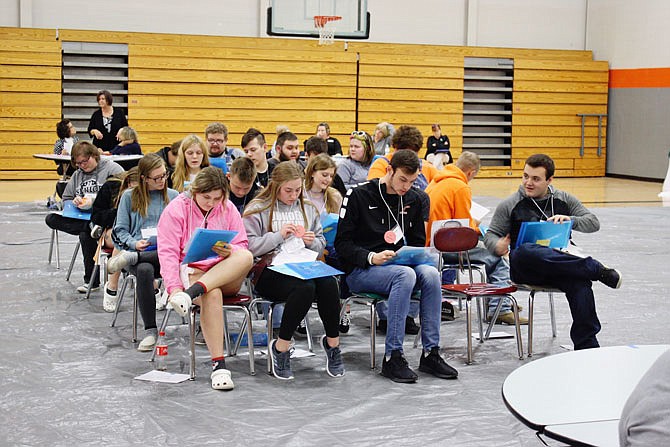New Bloomfield High School seniors participated in a simulation that presented them with many of the realities and difficulties that life after school may hold.
On Thursday, 48 seniors at NBHS took part in the REALL Simulation, which stands for "reality enrichment and life lessons." The program, in its second year at NBHS, is sponsored by Central Missouri Community Action.
"People always talk about how kids don't learn real life lessons in school, but schools already have so much on their plate and there's only so much they can do," said Kellie Pontius, community organizer for CMCA. "This is a great opportunity for members of the community to team up with the district to illustrate these lessons."
The simulation
Pontius said the program originated out of the Ozark Area Community Action Corporation, and five years ago, CMCA decided to purchase the materials to host their own. CMCA has hosted the simulations in eight different counties and the results are always fun to watch for Pontius and the various community volunteers that help out.
"This is something I - with my bald head and a lot of gray in my beard - I wish I had this when I was in school," NBHS principal Paul Cloudwright said.
Held in the gymnasium, dubbed "Reallville," the students sat in chairs that symbolized their homes and were surrounded by 12 tables that symbolized numerous agencies. Under their chairs were two folders that contained their current simulated situation.
The simulation is split into two sections, "proactive" and "reactive." Pontius said the proactive session simulates the life of someone making "positive choices," such as completing their high school education, getting education through trade school or college, staying out of trouble with the law and having a stable income. The reactive session reflects a life when "you don't make good choices."
"Maybe (your simulation will) have trouble with substance abuse, maybe they didn't finish high school or weren't able to maintain a job because you didn't go into work," Pontius said.
Pontius said the simulations are based on the real lives of people living in Missouri that CMCA assists.
The 12 agencies featured a superstore for grocery shopping, social services, a jail, a mortgage office, a bank, a "payday loan" style business/pawn shop, a luxury store, a check cashing agency, a utility payment center, a daycare, an employment agency and an employer. During the reactive session, the luxury store transformed into a community action agency, and the check cashing agency turned into an interfaith center/homeless shelter.
Throughout both sessions, community volunteer Todd Schattgen played the role of the black market where he would provide students with various contraband items if they were interested. Schattgen said he participated in the simulation in 2017 at NBHS and really enjoyed it.
"It really is fun to see all of the reactions from the kids when the reactive part starts," Schattgen said. "I probably won't have much business (in the black market) during the proactive part but things get pretty interesting during the reactive session."
The two sessions simulated a month each, with each week of the proactive session lasting 10 minutes and each week of the reactive session being 15 minutes. Each week, the students were required to take their children to daycare, go to work, feed their family, cash their check from work, and pay their mortgage and utilities.
The results
Despite taking a few simulated weeks to get the hang of things, the proactive session went smoothly for most students as they were able to have a handle on their responsibilities. A few students' simulated children ended up in social services after they couldn't pick them up from daycare in time, and one student ended up in jail for buying drugs off of the black market.
The reactive session was a drastically different story. By week four, 47 of the 48 students had been in jail, more than half of them had been evicted, less than half of them were still employed, and a vast majority had no money and high amounts of debt.
As the simulation was coming to a close, some students began turning themselves into jail as a solution to their problems. "Awful" and "I hate my life" were some of the responses from students when asked how things were going.
Senior student Tristain Painter found himself in jail during week two of the reactive session after his child was discovered abandoned. Painter found himself in and out of jail for the remainder of the reactive session. His simulated situation painted him as a high school drop out, an ex-felon and unemployed.
"During the second month, literally all I did was walk around and go to jail. I wasn't able to spend a single dollar," Painter said.
Pontius was extremely pleased with how the simulations turned out at NBHS. While she thinks the students still have a lot to learn, she was happy with their impressions.
"I think this was a great opportunity for community members and the school district to get together to teach these students about those life lessons whether it is just meeting your basic needs or how big the responsibility of children is. That component has been one of the most eye opening things across the board. Some of these students don't take (parenthood) as serious as they should," Pontius said.
The simulations appeared to have an impact on the students as they were highly engaged through the exercises and had many takeaways during their debriefing sessions.
"The people who talk about dropping out really must not know what they're getting themselves into because this was a wake-up call for me," senior student Brooklyn Souder said.
"I am never joking about dropping out again. If I'm struggling that much in the simulation, how much do you think I'd struggle in real life?" Painter said.

